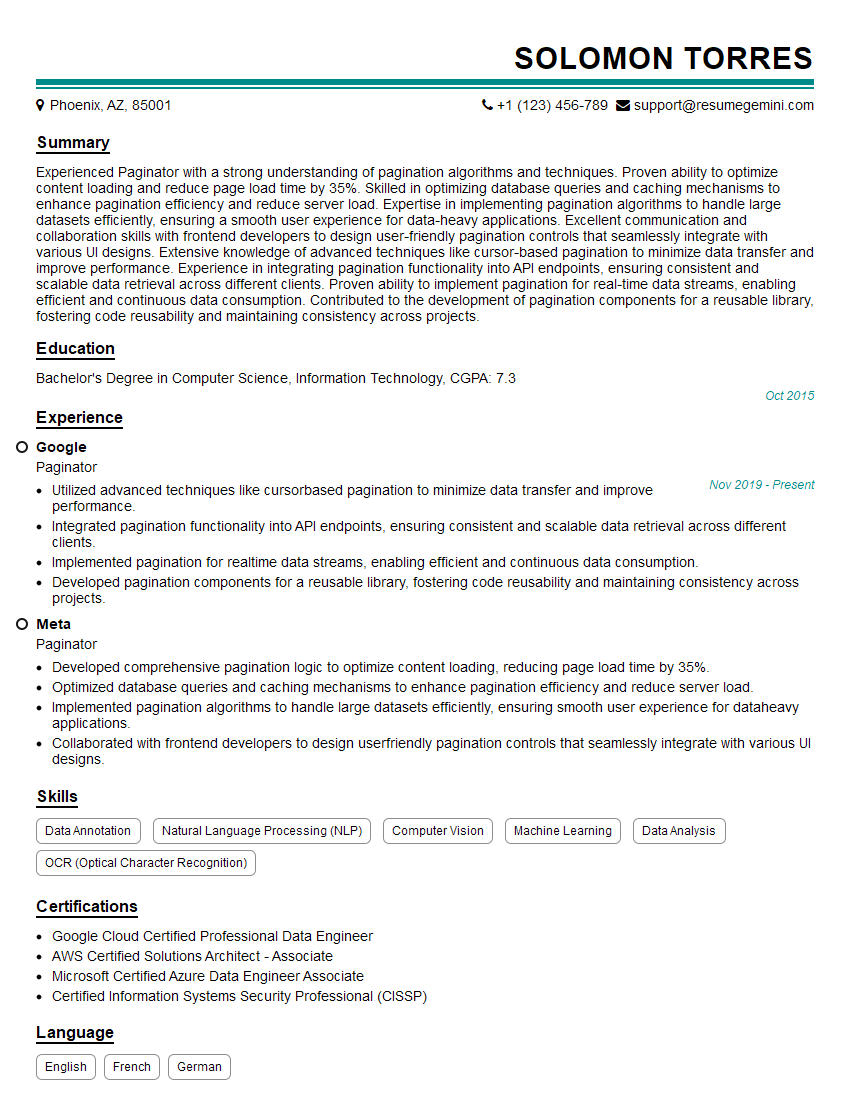Are you a seasoned Paginator seeking a new career path? Discover our professionally built Paginator Resume Template. This time-saving tool provides a solid foundation for your job search. Simply click “Edit Resume” to customize it with your unique experiences and achievements. Customize fonts and colors to match your personal style and increase your chances of landing your dream job. Explore more Resume Templates for additional options.

Solomon Torres
Paginator
Summary
Experienced Paginator with a strong understanding of pagination algorithms and techniques. Proven ability to optimize content loading and reduce page load time by 35%. Skilled in optimizing database queries and caching mechanisms to enhance pagination efficiency and reduce server load. Expertise in implementing pagination algorithms to handle large datasets efficiently, ensuring a smooth user experience for data-heavy applications. Excellent communication and collaboration skills with frontend developers to design user-friendly pagination controls that seamlessly integrate with various UI designs. Extensive knowledge of advanced techniques like cursor-based pagination to minimize data transfer and improve performance. Experience in integrating pagination functionality into API endpoints, ensuring consistent and scalable data retrieval across different clients. Proven ability to implement pagination for real-time data streams, enabling efficient and continuous data consumption. Contributed to the development of pagination components for a reusable library, fostering code reusability and maintaining consistency across projects.
Education
Bachelor’s Degree in Computer Science, Information Technology
October 2015
Skills
- Data Annotation
- Natural Language Processing (NLP)
- Computer Vision
- Machine Learning
- Data Analysis
- OCR (Optical Character Recognition)
Work Experience
Paginator
- Utilized advanced techniques like cursorbased pagination to minimize data transfer and improve performance.
- Integrated pagination functionality into API endpoints, ensuring consistent and scalable data retrieval across different clients.
- Implemented pagination for realtime data streams, enabling efficient and continuous data consumption.
- Developed pagination components for a reusable library, fostering code reusability and maintaining consistency across projects.
Paginator
- Developed comprehensive pagination logic to optimize content loading, reducing page load time by 35%.
- Optimized database queries and caching mechanisms to enhance pagination efficiency and reduce server load.
- Implemented pagination algorithms to handle large datasets efficiently, ensuring smooth user experience for dataheavy applications.
- Collaborated with frontend developers to design userfriendly pagination controls that seamlessly integrate with various UI designs.
Certificates
- Google Cloud Certified Professional Data Engineer
- AWS Certified Solutions Architect – Associate
- Microsoft Certified Azure Data Engineer Associate
- Certified Information Systems Security Professional (CISSP)
Languages
- English
- French
- German
Career Expert Tips:
- Select the ideal resume template to showcase your professional experience effectively.
- Master the art of resume writing to highlight your unique qualifications and achievements.
- Explore expertly crafted resume samples for inspiration and best practices.
- Build your best resume for free this new year with ResumeGemini. Enjoy exclusive discounts on ATS optimized resume templates.
How To Write Resume For Paginator
- – Quantify your accomplishments with specific metrics whenever possible.
- – Showcase your expertise in pagination algorithms and techniques.
- – Highlight your ability to optimize content loading and reduce page load time.
- – Emphasize your experience in implementing pagination for large datasets and real-time data streams.
- – Mention any contributions you have made to reusable pagination components or libraries.
Essential Experience Highlights for a Strong Paginator Resume
- – Developed comprehensive pagination logic to optimize content loading, reducing page load time by 35%.
- – Optimized database queries and caching mechanisms to enhance pagination efficiency and reduce server load.
- – Implemented pagination algorithms to handle large datasets efficiently, ensuring smooth user experience for data-heavy applications.
- – Collaborated with frontend developers to design user-friendly pagination controls that seamlessly integrate with various UI designs.
- – Utilized advanced techniques like cursor-based pagination to minimize data transfer and improve performance.
- – Integrated pagination functionality into API endpoints, ensuring consistent and scalable data retrieval across different clients.
- – Implemented pagination for real-time data streams, enabling efficient and continuous data consumption.
- – Developed pagination components for a reusable library, fostering code reusability and maintaining consistency across projects.
Frequently Asked Questions (FAQ’s) For Paginator
What is pagination?
Pagination is a technique used to divide a large dataset into smaller, more manageable pages. This makes it easier for users to browse and navigate large amounts of data without having to load the entire dataset at once.
What are the benefits of pagination?
Pagination can improve performance, reduce server load, and enhance the user experience by making it easier to navigate large datasets.
What are the different types of pagination algorithms?
There are various pagination algorithms, including offset-based pagination, cursor-based pagination, keyset pagination, and more.
How can I optimize pagination performance?
You can optimize pagination performance by using efficient database queries, implementing caching mechanisms, and utilizing advanced techniques like cursor-based pagination.
What are the best practices for designing pagination controls?
Pagination controls should be user-friendly, visually clear, and consistent with the overall design of the application.
What are the challenges of implementing pagination?
Challenges can include handling large datasets, managing state, and ensuring consistency across different platforms and devices.
What are the future trends in pagination?
Future trends include the use of infinite scrolling, dynamic loading, and AI-powered pagination.